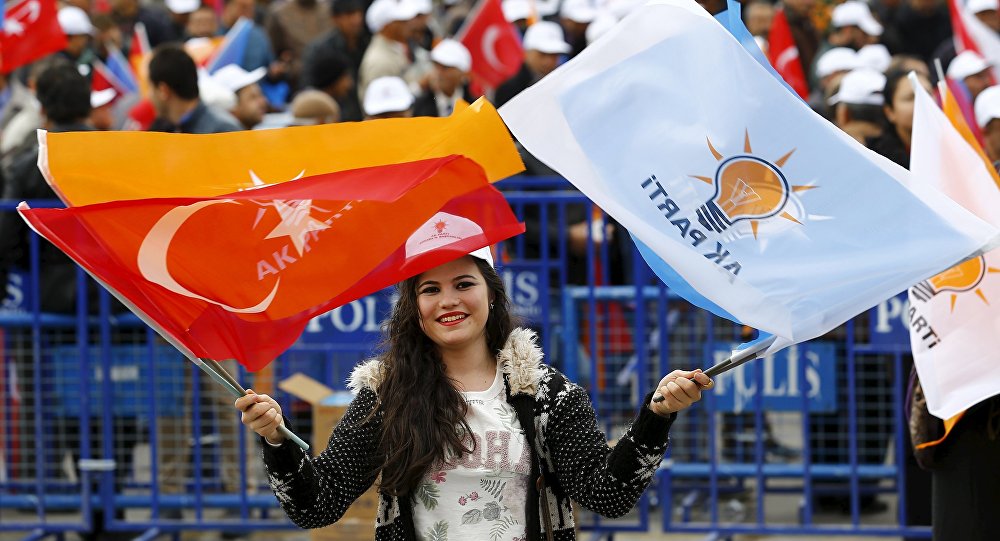

Istanbul: After five months of political deadlock, Turkey votes on Sunday in its second election since June, called after the long-dominant Justice and Development Party (AKP) lost its majority in a stunning setback.
Opinion polls are predicting a similar result this time round, which means the party co-founded by President Recep Tayyip Erdogan would have to form a power-sharing coalition, or call yet another election.
The vote in numbers
More than 54 million people aged 18 and over are registered to vote out of a population of almost 78 million in the Muslim majority country. Another 2.9 million are registered abroad.
Voting will take place at 175,000 polling stations, from 7:00 am to 4:00 pm (0400 GMT to 1300 GMT) in the east and from 8:00 am to 5:00 pm (0500 GMT to 1400 GMT) in the west.
Turkey elects MPs for four-year terms according to a proportional representation system from lists in 85 constituencies.
A party must win at least 10 percent of the vote to enter the 550-seat parliament -- a threshold criticised as one of the harshest election rules in the world.
Turkey does not allow exit polls, and first results will probably not be known until at least 1800 GMT.
Security will be high, with 255,000 police and 130,000 gendarmes on the streets.
The Organization for Security and Cooperation in Europe (OSCE) will have a team of 18 observers on the ground, in addition to 11 staff.
The issues
Security is a key concern following the renewed conflict between Kurdish rebels and the Turkish state and the massive Ankara bombings blamed on the Islamic State group.
The country is deeply polarised, with many sectors of society -- the Kurds, Islamists, secular Turks -- at odds.
There are also worries about the state of democracy in Turkey, with Erdogan increasingly cracking down on rivals and critical media.
Growth in the $800 billion economy slowed in 2014 to below three percent, while the Turkish lira has tumbled over 25 percent and the security fears have hit tourism.
The authorities are also struggling to cope with an influx of over two million refugees from the Syrian conflict.
The parties
Sixteen parties with more than 8,400 candidates are running, but only four are seen as having any chance of winning seats in parliament. Twenty-one people are standing as independents.
The favourite is the AKP led by Prime Minister Ahmet Davutoglu, which has won every election in Turkey since 2002.
But opinion polls suggest it will fare little better than in June, when it secured just over 40 percent of the vote and 258 seats, not enough for a majority.
The secular Republican People's Party (CHP), the party of Turkey's founding father Mustafa Kemal Ataturk, is predicted to come second. It won 25 percent of the votes and 132 seats in June.
Third place is tipped to go to the Nationalist Movement Party (MHP) chaired by Devlet Bahceli, which won 16 percent of the votes and 80 seats last time round.
The party everyone is watching is the Peoples' Democratic Party (HDP) of Selahattin Demirtas which in June became the first movement to enter parliament representing the country's Kurds, estimated at 15-20 million. It won just over 13 percent of the vote and 80 seats, enough to prevent an AKP majority.
Post-election scenarios
A clear AKP victory, in which it secures at least 276 seats, would end the political uncertainty of the past five months, at least in theory.
Some analysts say a coalition may be the best way forward to overcome internal divisions and improve Turkey's international standing.
But others warn that a power-sharing deal may not last long, pointing to the unstable governments of pre-AKP years.
If there is another hung parliament, political parties will have 45 days to form a coalition, with the AKP's most likely bedfellows the secular CHP, or perhaps the nationalist MHP.
If they fail again, another election could be called within three months.
But Davutoglu declared that another was not on the agenda for fatigued voters, saying: "Turkey would not tolerate another re-run."
AFP